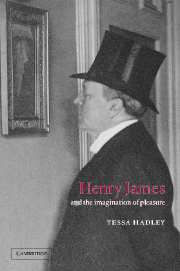Book contents
- Frontmatter
- Contents
- Acknowledgements
- Introduction
- 1 ‘Just you wait!’: reflections on the last chapters of The Portrait of a Lady
- 2 ‘As charming as a charming story’: governesses in What Maisie Knew and ‘The Turn of the Screw’
- 3 ‘The sacred terror’: The Awkward Age and James's men of the world
- 4 Blushing in the dark: language and sex in The Ambassadors
- 5 Poor girls with their rent to pay: class in ‘In the Cage’ and The Wings of the Dove
- 6 ‘A house of quiet’: privileges and pleasures in The Golden Bowl
- Notes
- Bibliography
- Index
6 - ‘A house of quiet’: privileges and pleasures in The Golden Bowl
Published online by Cambridge University Press: 22 September 2009
- Frontmatter
- Contents
- Acknowledgements
- Introduction
- 1 ‘Just you wait!’: reflections on the last chapters of The Portrait of a Lady
- 2 ‘As charming as a charming story’: governesses in What Maisie Knew and ‘The Turn of the Screw’
- 3 ‘The sacred terror’: The Awkward Age and James's men of the world
- 4 Blushing in the dark: language and sex in The Ambassadors
- 5 Poor girls with their rent to pay: class in ‘In the Cage’ and The Wings of the Dove
- 6 ‘A house of quiet’: privileges and pleasures in The Golden Bowl
- Notes
- Bibliography
- Index
Summary
James's fascination with privilege and the privileged predicament culminates in his last completed novel, The Golden Bowl (1904). His protagonists and his plot and the late Jamesian manner are all tensed up to an improbable ultimate high pitch of performance; from all of them the novel exacts extreme demonstrations of elegance, of complexity, of rarity. The novel is emptied of any significant life outside the Ververs' rarefied oxygen tent, pitched at the pinnacle of social amenity and exempt from all the ordinary pains and mess of material struggle. (Nicola Bradbury calls it the ‘goldfish bowl’.) The ranks of servants that attend everywhere are mute as furniture. There are no Venetians in brown jackets, no comrades sleeping off sorrows in the dusty grass of the park. Only occasionally, with Charlotte, a moment's breeze blows in from a world outside: she first arrives in the novel fresh from ‘winds and waves and custom-houses … far countries and long journeys’ (58); later she comes to the Prince from a day spent wandering in London streets and lunching ‘on some strange nastiness, at a cookshop in Holborn’ (231); and then there are the train timetables and the inn at Gloucester.
James's subjects are the vacancy that follows on that exemption from material struggle – what to do? what to be? where to go? when there is no need – and the resulting intensifications of attraction, angst and antagonism inside the narrowness of the privileged space.
- Type
- Chapter
- Information
- Henry James and the Imagination of Pleasure , pp. 144 - 177Publisher: Cambridge University PressPrint publication year: 2002



